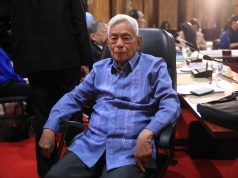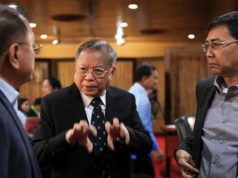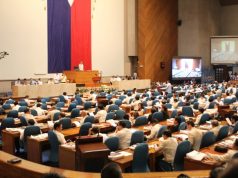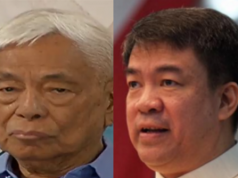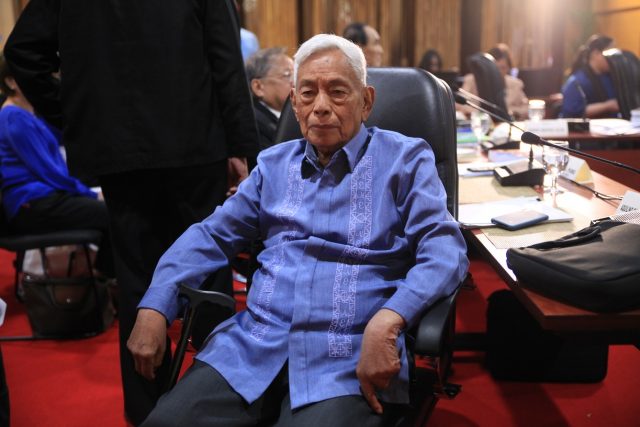
MANILA, Philippines — A four-year presidential term with one re-election; 87 senators representing 12 states, a federal administrative region and overseas Filipinos; a prohibition on political dynasties; more stringent education qualifications for those seeking elective office; and deadlines for courts to hand down decisions.
These were among the features in the presidential federal government former Senate President Aquilino Pimentel Jr. envisions, which he shared with his fellow members of the Consultative Commission reviewing the 1987 Constitution.
Pimentel stressed that the presidential form of government is more familiar to Filipinos and would, therefore, be easier for the to follow compared to the parliamentary and semi-presidential forms of government.
The Concom agreed, voting 11 to seven Tuesday to include the presidential form in their recommendations to President Rodrigo Duterte in July.
Pimentel said he is for balancing of powers among the executive, legislative, and judicial branches of government, as opposed to powers “more concentrated” in the legislature, which would happen under a parliamentary form of government.
His proposal will retain a bicameral legislature, the Federal Congress, with members of the Senate elected by federal states and those of the House of Representativesby districts.
Each of the proposed 12 federal states will be represented by six senators elected by qualified voters in state-wide elections. Add to that another six senators for Metro Manila (the federal administrative region), and nine overseas senators, for a total of 87.
Pimentel justified the increase saying the current 24 senatorial limit was based on a Philippine population of 20 million. Now, the Philippines has more than 104 million people.
He also explained the number of senators to be elected by each federal state. “Unless we do that, candidates from Luzon would normally, in an election for the Senate, dominate the results of the elections.”
Pimentel pointed out that in the last elections, “only one outside of Luzon was elected to represent the Visayas, and that is Franklin Drilon!”
“Nina Rasul was the only Muslim representation in the Senate. After her term was ended, wala na (there was no one else)! And unless we federalize, I am afraid that there will never be a Muslim Senator elected at large. Napakahirap (It’s difficult), especially because of so many misunderstandings,” he added.
The 12 federal states proposed by Pimentel:
- The Federal State of Northern Luzon, made up of nine provinces from Regions I and II, with Tuguegarao City as the capital
- The Federal State of Cordillera, made up of six provinces from the Cordillera Administrative Region, with Baguio City as the capital
- The Federal State of Central Luzon, made up of seven provinces from Region III, with Tarlac City as the capital
- The Federal State of Southern Tagalog, made up of five provinces from Region IV-A, with Tagaytay City as the capital
- The Federal State of Bicol, made up of five provinces from Region V, with Legazpi City as the capital
- The Federal State of Eastern Visayas, made up of six provinces from Region VIII, with Catbalogan City as the capital
- The Federal State of Central Visayas, made up of five provinces from Region VII, with Toledo City as the capital
- The Federal State of Western Visayas, made up of six provinces from Region VI, with Iloilo City as the capital
- The Federal State of Minparom, made up of five provinces from Region IV-B, with Mamburao, Mindoro Occidental, as the capital
- The Federal State of Northern Mindanao, made up of 11 provinces from Regions IX, X, and XIII, with Cagayan de Oro City as the capital
- The Federal State of Southern Mindanao, made up of 11 provinces from Regions XI, XII, and XIII, with Davao City as the capital
- The Federal State of Bangsamoro, made up of five provinces from the Autonomous Region in Muslim Mindanao, with Marawi City as the capital
Metro Manila will become an administrative region like Washington DC in the United States or Kuala Lumpur in Malaysia.
He stressed that these federal states must also cover Scarborough Shoal, the Spratly Islands, and the Philippine or Benham Rise.
“Even Sabah is ours,” Pimentel said.
Under a presidential form of federal government, he proposed, the president and vice-president will be elected nationwide, and as a team. Pimentel said it was time for educational qualifications of elected officials to be stricter, not just that they are “able to read and write.”
“Para masigurado naman natin na naiintindihan mo ‘yung trabaho na pinapasukan mo (So that we can be sure that you understand the work you’re getting into),” he said.
Presidential and vice-presidential candidates must have at least a baccalaureate degree from colleges and universities recognized by the government.
As for the current six-year term without re-election, he said: “Maraming nagsasabi doon na medyo kulang siguro ‘yun (There are people out there who say that’s not enough).”
He stressed the four-year term with one re-election is “just a suggestion. I am not dying to have that accepted.”
His presentation also noted “term limits under the current Constitution are intended to apply to those who had been president.”
Since the 1987 Constitution will be revised anyway, Pimentel also recommended putting a clear prohibition regarding political dynasties.
“Ilagay na rin natin siguro na political dynasties are prohibited, meaning to say ang isang political leader, mayor, governor… hindi puwedeng ipasa niya ang kanyang kapangyarihan sa kanyang asawa, sa kanyang mistress, sa kanyang anak, kamag-anak up to … the first cousin (Let us also include that political dynasties are prohibited, meaning to say, a political leader, mayor, governor… cannot pass on his or her power to his or her spouse, mistress, child, relatives up to… the first cousin),” he said.
The Supreme Court structure will also be retained, but he proposed that all courts meet the following constitutional deadlines in rendering their decisions:
- Supreme Court: two years from filing
- Court of Appeals: one year and eight months from filing
- Sandiganbayan and other appellate courts: one year and eight months from filing
- Regional trial courts: one year and six months from filing
- City and municipal courts: one year from filing
There must also be deadlines for Sharia and other tribal courts.
Pimentel said Bangsamoro culture and tradition will be fully respected, although there are certain practices by Muslims in other countries that should be banned, such as stoning women to death and cutting off thieves’ hands, which he called “cruel and unusual punishment.”




